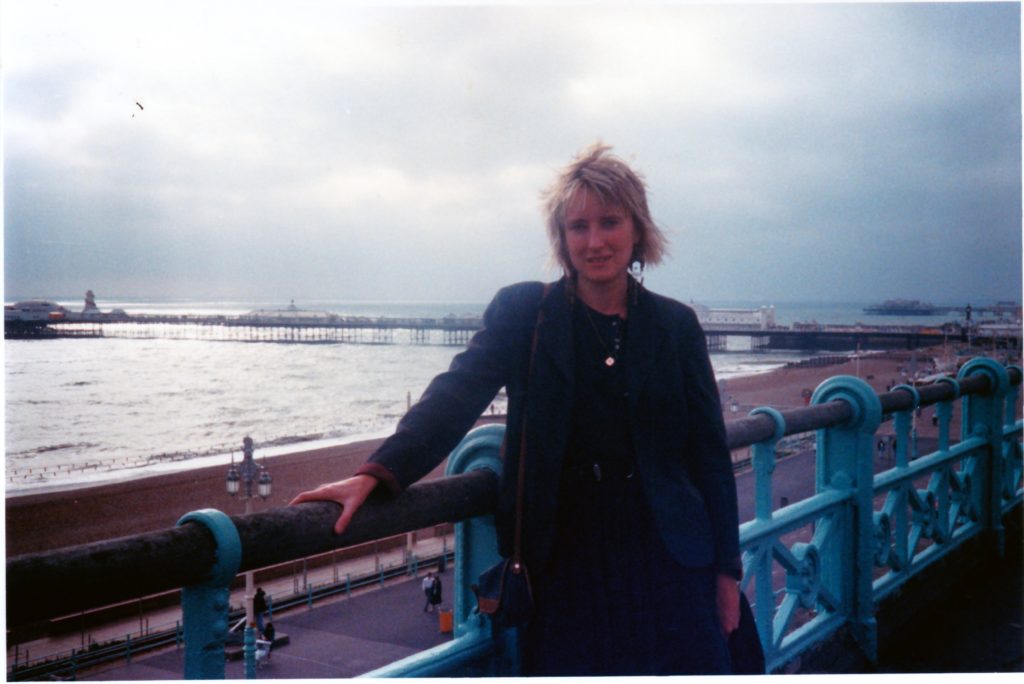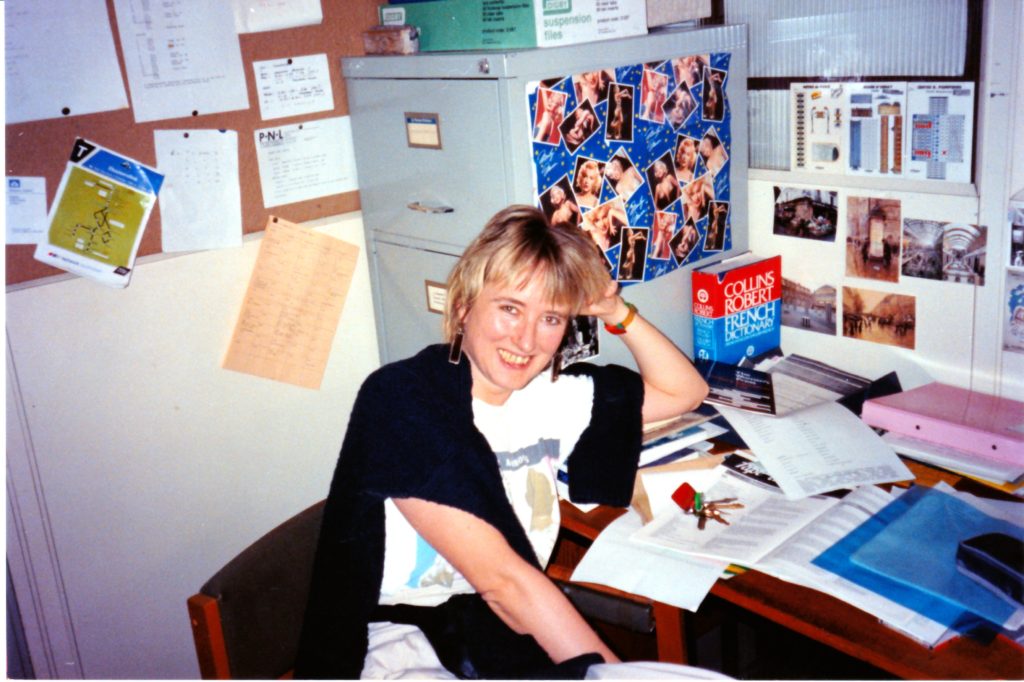For my interview for the job teaching French at the Polytechnic of North London I wore the red tulip dress. I had spent the previous night with Frank so was not on best form. But they were nice to me, and I spoke enthusiastically about teaching French cinema and mixed ability classes. At PNL my background as a schoolteacher seemed to be a positive advantage – they were actually looking for someone who could teach. I did not think for a minute I’d got the job. At Victoria I ate a consolatory bar of chocolate, and once back in my pink and blue living room in Brighton I collapsed in front of the TV. When the Head of Department rang to offer me the job I was in shock. He was also shocked – that I did not immediately accept, but instead asked what the salary would be. Apparently that was a minor consideration. But I explained I would have to travel to London so needed more money. The next day I consulted Frank, and my therapist. Frank did not say much – I had broken the rule of not phoning him at anything other than the appointed hour, and he was agitated. The therapist, who expressed her opinion rather more freely than she was supposed to, regarded it as a ‘no-brainer’: ‘people have actually heard of PNL’. ‘Unlike that totally culturally insignificant dump where you work now’ was the implication. I realised that going to London would give me an excuse to stop seeing that therapist, which was a definite plus, so I took the job, and started work in September 1989.
I was welcomed into the French department at PNL, and gradually learnt the technical terms for the exam board: ‘couper la poire en deux’ – splitting the difference when the first and second marker didn’t agree, and ‘il y a une couille dans le pâté’ – which could be roughly translated as ‘this marks list is a cock-up’. I was surprised to discover that the students did not attend every class, and that my colleagues were sometimes late for class as well. Iris, who like me had done French at Oxford, but two decades earlier, was reliably late for everything, but nobody minded because she was funny and kind and always there till 7pm, ready to listen to the students’ worries. She was quite punctual in leaving at 7, however, as she liked to listen to ‘The Archers’ as she did her long drive home from Kentish Town to Putney. Iris and I were a little oasis of Englishness in a sea of gallicity, and when we talked about the goings on in Ambridge, the Parisian eyes of our colleagues glazed over.
Iris shared an office with Marcel, who was punctual and neat, and grew red geraniums on the windowsill of the office. It was a miracle that he and Iris did not come to blows as Iris’s section of the office was a deluge of papers and books. Marcel was also horrified by Iris’s tendency to spill food and drink on the Chinese silk shirts her husband Johnny had brought back from a business trip to Beijing for her. When I offered to get Iris a sandwich from the Greek deli over the road he would say ‘no houmous!’ emphatically. Every year around Christmas Iris and Johnny had a party in their house in Putney and we were all invited. Johnny cooked a huge ham, and a salmon, and made delicious salads, while Iris ‘tidied the house’ – this activity consisted of throwing the excess books and papers that covered every surface into the cellar. A high point in the party was the moment when Iris opened the door to the cellar so that we could admire the hellish chaos she had created.
By the time I started work in London my hair was a bit less spiky, but I still had the bleach highlights and the lime-green cardigan. The French department, or more precisely Marcel received frequent visits from Barry from Film Studies. They taught a course on French cinema together, but there were some tensions between them. Marcel described how Barry would sit in the front row in his lectures and look at him disapprovingly whenever he waxed too lyrical and lost his grasp of ‘film theory’. Referring to Brigitte Bardot as a ‘natural woman’ was a terrible faux pas. Outside class they got on much better and liked to play a game of matching their colleagues to a film or style of cinema. The Dean was definitely film noir. They fixed their critical gaze on me in the lime-green cardy and a short black skirt and both exclaimed in unison ‘nouvelle vague!’.
On Mondays I had to entertain 100 beginners in French in a lecture theatre – not in any way a conducive environment for language learning. I spent the weekends choosing tiny snippets of French TV and inventing quizzes to accompany them. I felt I had to dress up for these pedagogic ordeals, and so I bought a 1940s suit from a second-hand shop in Kemptown. Somehow the suit gave me the confidence to face my large audience. After the lecture I would return to the haven of the French corridor to prepare the next day’s classes. The audio-visual course we used with the beginners was called ‘Avec plaisir’, and Marcel and I delighted in imagining that it was actually the preamble to a porn film, such were the meaningful glances and ambiguous gestures exchanged by the hapless actors in the videos.
These were exciting times at PNL – our students loved us and we loved them, and the combination of new and old Humanities subjects in one building meant that everyone was thinking differently. The Management thought even more differently and decided to close down Classics and South Asian Studies. So the students occupied the building and ran the library and the canteen – probably a high point in their education. The occupation was even covered by the national BBC news – the ‘loony left’ was a favourite news theme in those days. The staff transferred to a building in Tufnell Park, and to a more or less constant union meeting, debating what to do about the forthcoming exams. Two of us were delegated to address the occupation – another occasion to wear the suit. We won a small victory over the timing of the exams, but after a few weeks the Dean forced her way into the occupied building with a pair of wire-cutters she had bought in a nearby ironmongers. The occupation ended and the courses were closed.
Soon after this the Polytechnic became a University. We got UNL mugs and biros in our pigeon-holes, and were invited to a celebration in the cavernous and dimly lit space of ‘The Rocket’ on the Holloway Road. There was a huge sickly-sweet cake, jazz and sparkling wine but the enforced jollity did not quite work. You could not help feeling that the soul had gone out of the place. Three years later the whole Humanities Faculty was moved to the main building on the Holloway Road, where we could more easily be kept under control. The Vice-Chancellor was rumoured to have said that he would get rid of the lot of us if he could. Marcel decided to retire, he could not face the upheaval of the move. We were bereft, and there was a fabulous party in his honour, with Barry at the piano singing a specially composed song to an old Maurice Chevalier tune. On the Holloway Road site we discovered that the Humanities were a very small cog in a large wheel of the mysterious Polymers and Business and the like. Predictably our offices and classrooms were not ready for the start of term, and the French lectrice threatened to leave – ‘but it is ’orrible in ’olloway’.
Iris carried on for a few more years, and then she too left us, even more bereft. Our old building in Kentish Town became a Pizza Express and luxury flats. Quality Assessment kept us at work till late in the evenings, filling filing cabinets with papers no-one would ever read. I bought a smart linen jacket and took the second-hand suit back to the shop where I had bought it in the hope of persuading them to sell it on, but they looked at it sniffily and would not take it back.

Wearing the jacket of the second-hand suit on Brighton sea front

In the office at the Poly on a more ‘dressed down’ day…Note the ‘bum bag’…
Where I come from, when hitting a snag, a “couille” would usually be found in “potage” as opposed to “pâté”, I wonder if that is a geographical or diachronic variation.
The person who introduced me to this phrase was from Normandy Alain – glad you know a version of it!
So hard to pull power dressing off successfully I the workplace. Why is that? Because women are trying too hard to emulate men in suits and at the same time retain some subtle sexiness? To avoid the cardinal sin of being ‘ frumpy’ must we spend a small fortune on the perfectly cut designer suit and accessories – and have the body shape to wear it?
Yes indeed, and looking at women politicians at the moment all of these issues are in my mind. The whole extra level of work they have to do to look ‘right’, compared to men. And the flack they get if they ‘fail’….
And the pressure to purchase the expensive hair and beauty products associated with power dressing and feminity!
Hello Lynn,
I came across your site looking for information about Annie Ernaux, and recognised your name, one click to another lead me here! I was a (mature) student at U-PNL from 1991-1995. I remember doing a long essay on Roman Photo which you were enthusiastic about and suggested I could even publish!
Having read this piece, I think I may know who is hiding behind Iris and Marcel…
That time was a privilege, a great teaching team, fantastic cross-section of society amongst the students, and student grants were still a right!
I now live in Paris, where I moved after UNL, have written for a French music fanzine, take photos, translate in the music field, and even participated in a radio show on France Culture about Beckett, so all those lessons didn’t go to waste!
Thanks to you and any of the other staff from back then you may still see. You made a difference to the life of this one ex-gardener for whom my present life would have seemed impossible before that decision to become a student at 29!
Dear Gary, how lovely to hear from you, and to hear that you have done so much with your degree, and are leading such a fab life in Paris! You’ll be pleased to know that Iris and Marcel are still going strong!